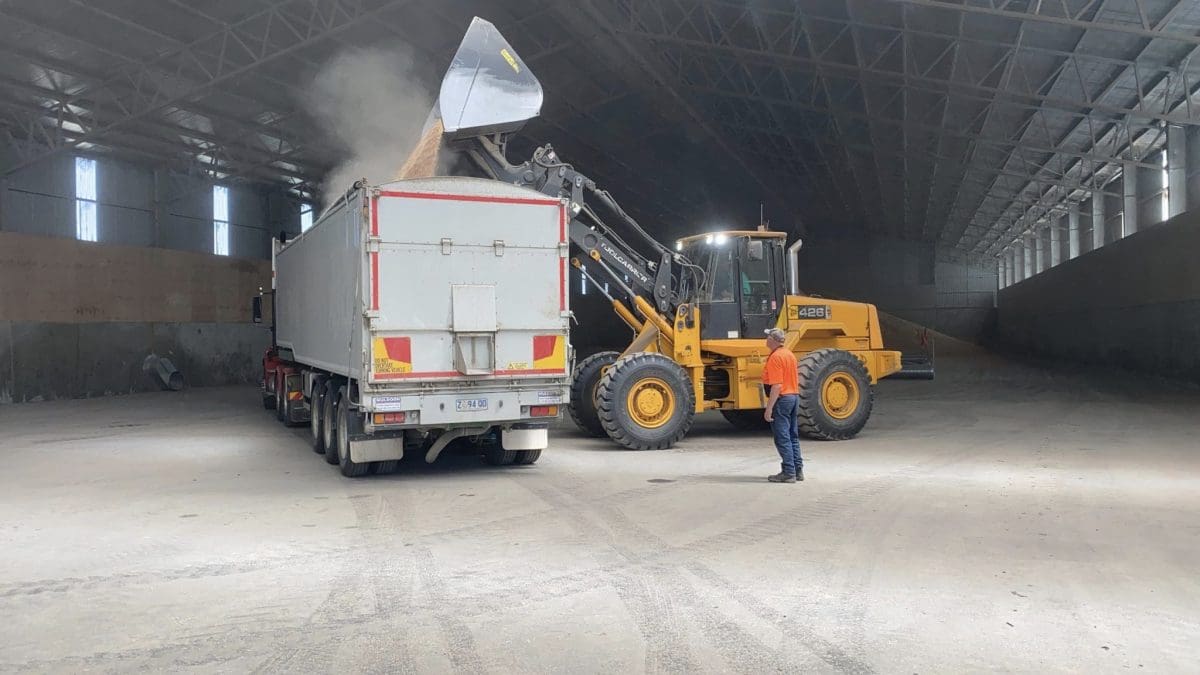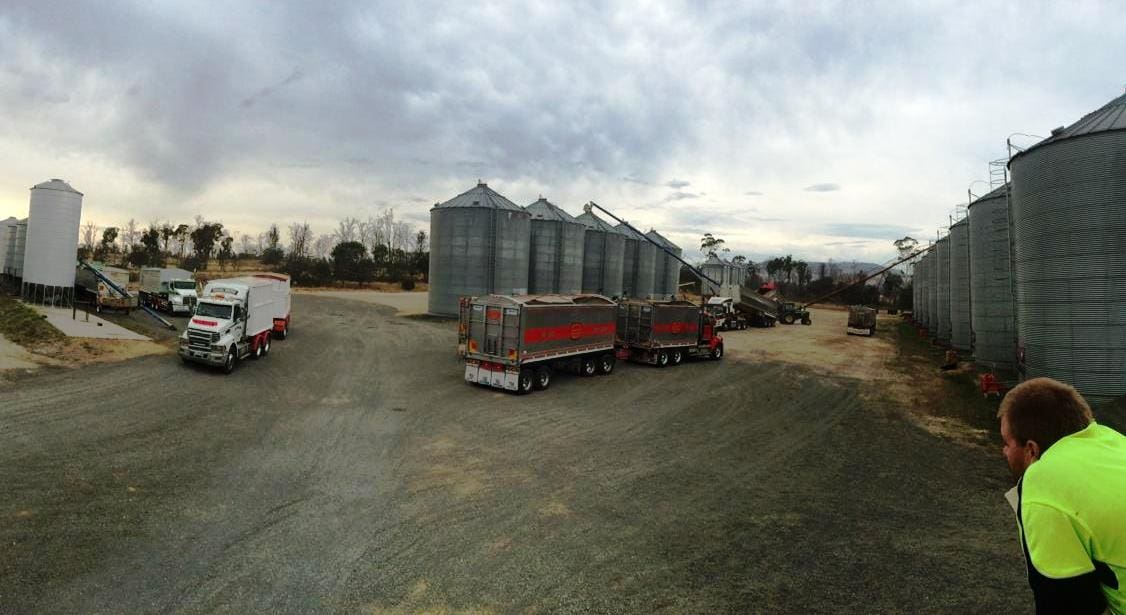
Outloading grain earlier this year at the TAP AgriCo-owned bulk-storage shed at Powranna. Photo: XLD Commodities
TWO tenanted grain-storage sites in Tasmania’s Midlands region have come to the market with Elders’ listing of TAP AgriCo’s facilities at Powranna.
Located around 20 kilometres south of Launceston, the sites are 1.5 kilometres apart, and offer the buyer a rare opportunity to purchase a bulk-storage facility with potential to be developed for other uses.
TAP AgriCo was formed as a grain marketing and storage business for some of Tasmania’s largest growers, and in 2011 bought the Powranna Road site from Roberts Ltd.
The site features silos which enable a total of 11,500 tonnes of grain to be stored in numerous segregations.
In 2015, TAP AgriCo built a storage shed with capacity to hold 14,000t of grain on its second Powranna site, which boasts frontage to the Midlands Highway.
“For the new owner, there’s potential to add value to the asset, and to increase yield on the asset,” TAP AgriCo director and ECS Botanics managing director Alex Keach said.
“For someone wanting to enter the market, you could participate in the upside for Tasmanian agriculture, which is booming.”
Following a change of strategy, TAP AgriCo late last year leased the facility to XLD Commodities, and its lease runs until November 2023 at $220,000 plus GST per annum.
Grain deficit
Tasmania has seen a significant increase in the value-adding of grain in recent years with the construction of the Ridley aquafeed mill at Westbury in 2019 which sold in July to Skretting Australia for $54.85 million, and the Danish-owned BioMar aquafeed mill in 2020.
They are Tasmania’s two biggest grain users, and the third, Tasmania Feedlot, is located next door to TAP AgriCo’s Midlands Highway site.
Owned by Japan’s retail AEON Group, the feedlot consumes an estimated 25,000-30,000t of barley per year.
TAP AgriCo has accumulated inputs for the aquafeed mills, the feedlot and other end users, including barley for Boortmalt’s Joe White Maltings plant at Devonport.
It has also handled and traded in pellets made on the mainland and used by Tasmania’s dairy and other sectors.
The ASX-listed ECS Botanics bought into TAP AgriCo in 2019 when it was looking at Powranna as a storage site for industrial hemp and other products.
Earlier this year, ECS Botanics bought Murray Meds, which shifted its hemp-production focus to the Murray Valley in north-west Victoria.
Unique listing
Elders rural real estate state manager Allan Barr and sales executive Adam Chilcott have been appointed to manage the sale and expect widespread interest both locally and from the mainland.
“There are no comparable soft commodity-storage facilities of this scale in Tasmania,” Mr Chilcott said.
“Additionally, the existing tenancy offers passive investors an attractive yield in the current environment.”
Price expectations for the facility are $3.5 million, and offers will be considered up to September 22.”
The mixture and size of segregations at the facilities allows for niche grades of commodities to be exported in containers to boutique markets.
Combined area of the facilities is 7.7 hectares, and they include a weighbridge with a 60-tonne capacity, sampling stand and amenities, a Kotzur-designed and installed drive-over hopper system, and aeration system for the silos.

TAP AgriCo’s Powranna silo site receives grain during a previous harvest. Photo: TAP AgriCo
Expanding markets
Construction of two new aquafeed plants, as well as expansion by Tasmanian companies like Tasmanian Stockfeed Services, have lifted the island state’s grain imports from the mainland to around 350,000t per year.
This is used to supplement its own grain production, which usually comes in at less than 100,000t.
To evidence this, ABARES has forecast Tasmania’s 2021-22 wheat crop at 60,000t, barley at 19,000t and canola at 5000t.
H2-type wheat as used in aquafeed pellets is where the greatest growth is being seen in value adding in Tasmania.
Because of Tasmania’s long and mild seasons, its protein targets are hard for its growers to hit.
Tasmania is, however, a grower of high-yielding and high-quality canola and malting barley, and production of both may will increase if seasons are kind and price incentives for growers exist.
Grain Central: Get our free cropping news straight to your inbox – Click here

HAVE YOUR SAY